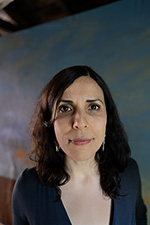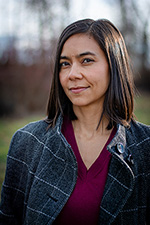|
|
Early Bird deal this month!
Sadiqa de Meijer,
Open Season cnf judge
 Fiction Editorial Board intern Star Kashi talks with the Open Season Awards cnf judge about the textures that belong in your writing, how every retelling is a narrowing, and her upcoming book In the Field. Fiction Editorial Board intern Star Kashi talks with the Open Season Awards cnf judge about the textures that belong in your writing, how every retelling is a narrowing, and her upcoming book In the Field.
SK: In your recent poetry book alfabet/alphabet, as you write about the transition between Dutch and English, you talk about being between the two languages. As an immigrant myself, going through the same transition right now, I feel the detachment never really leaves; you only learn how to manage it. And it can be disheartening to make comparisons to native speakers. What’s your advice for writers who are going through the same challenges?
SdM:
I would like people to appreciate that there are multiple Englishes, many of which are inflected with the presence of another language, or several languages. If you're a writer in English, get as comfortable as possible with your instrument: listen to poetry, read good books closely, speak lines out loud, look up any words that are new to you, try them out in conversation. But hold on to your first language(s), and don't attempt to erase their presence in your English. Your migrations, and the histories that gave rise to them, and the cultures that continue through your practices, and the landscapes where they originated, are textures that belong in your writing voice.
Read the rest of Sadiqa de Meijer's interview.
Corinna Chong,
Open Season fiction judge
 Past work study student and screener Saverio Colasanto talks with the Open Season Awards fiction judge about writing by hand as a method of battling perfectionism, not adhering to structural signposts or plot points, and her recently published book Bad Land. Past work study student and screener Saverio Colasanto talks with the Open Season Awards fiction judge about writing by hand as a method of battling perfectionism, not adhering to structural signposts or plot points, and her recently published book Bad Land.
SC: How has your writing process evolved over your career? What does your writing routine tend to look like?
CC:
I think I am more efficient with the time I set aside for writing now, mostly because I know how precious it is. Having the responsibilities of a full-time job and parenthood can very quickly edge out time for writing, which has led me to be very intentional about reserving space (both temporal and mental) for writing projects. All that said, I am not very good at having a strict writing regimen, though I deeply admire those who commit to waking up at 4 am to write before going to work. My teaching job affords me the privilege of having flexible time in spring and summer, which is when I get most of my writing done.
Especially when in the early stages of a project, I have found that writing by hand is extremely helpful as a method of battling my debilitating perfectionism. Writing by hand forces me to surrender to the messiness of drafting and get the ideas down so I have something to work with. Then, once I’ve got some momentum going, I transcribe my scribblings into a word doc and revise as I go. I love this part the most, because it’s where I can obsess over the shape and sound of sentences. I continue in the word doc until I (inevitably) hit another rut, at which point I return to the journal and start the process again. Developing this routine has helped me to spend far less time staring at a blank screen with a blinking cursor, growing more and more demoralized with every passing second. I think I’m better now at accepting that writing isn’t a linear process, but one that involves plenty of meandering and retracing.
Read the rest of Corinna Chong's interview.
Matthew Hollett,
Open Season poetry judge
 Poetry Editorial Board intern Rebecca Rogerson talks with the Open Season Awards poetry judge about art as fundamentally collaborative, poetry’s capacity for playfulness, and his most recent book, Optic Nerve. Poetry Editorial Board intern Rebecca Rogerson talks with the Open Season Awards poetry judge about art as fundamentally collaborative, poetry’s capacity for playfulness, and his most recent book, Optic Nerve.
RR: There is often a playfulness to your poems; they are funny—filled with wordplay, references and clever juxtapositions—without being "funny poems." What role does humour play in poetry, for you?
MH:
It’s about unexpectedness. I like trying to see things in a new way, as if for the first time. Humour or whimsy is one way to do that—a punchline can leave you reeling, reconsidering how you thought the world was organized. A good poem has to be more than a punchline, but getting back to the “interesting miscommunications” idea, humour is such a useful tool for conveying ideas. It can help people see and understand things differently in a way that feels inviting and inclusive, rather than preachy and off-putting.
When I’m reading my work for an audience, I often choose more playful poems. The immediate feedback of laughter (or at least a chuckle or two) is satisfying, and levity also feels like a way of reaching folks in the audience who might think of poetry as dour or boring.
Read the rest of Matthew Hollett's interview.
|
|
|
|
|
|
|
|
|
|
|
|